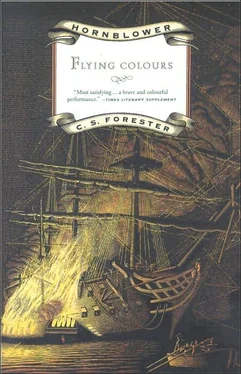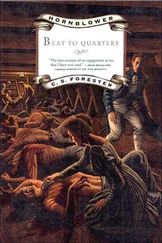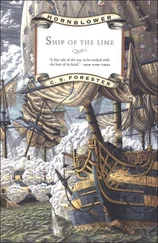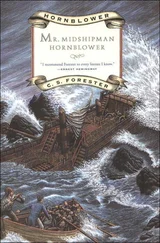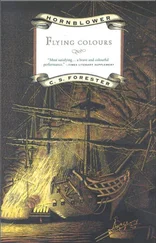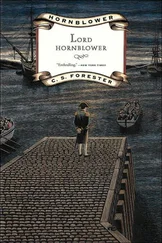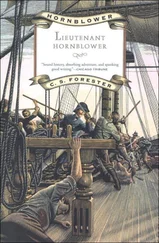Cecil Forester - Flying Colours
Здесь есть возможность читать онлайн «Cecil Forester - Flying Colours» весь текст электронной книги совершенно бесплатно (целиком полную версию без сокращений). В некоторых случаях можно слушать аудио, скачать через торрент в формате fb2 и присутствует краткое содержание. Год выпуска: 1989, ISBN: 1989, Издательство: Back Bay Books, Жанр: Исторические приключения, Путешествия и география, Морские приключения, на английском языке. Описание произведения, (предисловие) а так же отзывы посетителей доступны на портале библиотеки ЛибКат.
- Название:Flying Colours
- Автор:
- Издательство:Back Bay Books
- Жанр:
- Год:1989
- ISBN:0316289396
- Рейтинг книги:5 / 5. Голосов: 1
-
Избранное:Добавить в избранное
- Отзывы:
-
Ваша оценка:
- 100
- 1
- 2
- 3
- 4
- 5
Flying Colours: краткое содержание, описание и аннотация
Предлагаем к чтению аннотацию, описание, краткое содержание или предисловие (зависит от того, что написал сам автор книги «Flying Colours»). Если вы не нашли необходимую информацию о книге — напишите в комментариях, мы постараемся отыскать её.
Flying Colours — читать онлайн бесплатно полную книгу (весь текст) целиком
Ниже представлен текст книги, разбитый по страницам. Система сохранения места последней прочитанной страницы, позволяет с удобством читать онлайн бесплатно книгу «Flying Colours», без необходимости каждый раз заново искать на чём Вы остановились. Поставьте закладку, и сможете в любой момент перейти на страницу, на которой закончили чтение.
Интервал:
Закладка:
“No other news? There was a child coming.”
“None that I know of. I have been four months in this ship.”
Hornblower’s head sunk on his breast. The news of Leighton’s death added to the confusion of his mind. He did not know whether to be pleased or sorry about it. Barbara would be as unattainable to him as ever, and perhaps there would be all the jealous misery to endure of her re-marriage.
“Now,” said Hardy. “Breakfast?”
“There’s Bush and my coxswain in the cutter,” said Hornblower. “I must see that all is well with them first.”
Chapter Sixteen
A midshipman came into the cabin as they ate breakfast.
“The fleet’s in sight from the masthead, sir,” he reported to Hardy.
“Very good.” As the midshipman went out again Hardy turned back to Hornblower. “I must report your arrival to His Lordship.”
“Is he still in command?” asked Hornblower, startled. It was a surprise to him that the government had left Admiral Lord Gambier in command of the Channel Fleet for three years, despite the disastrous waste of opportunity at the Basque Roads.
“He hauls down his flag next month,” said Hardy, gloomily. Most officers turned gloomy when discussing ‘Dismal Jimmy’. “They whitewashed him at the court martial, and had to leave him his full three years.”
A shade of embarrassment appeared in Hardy’s expression; he had let slip the mention of a court martial to a man who soon would endure the same ordeal.
“I suppose they had to,” said Hornblower, his train of thought following that of his fellow captain as he wondered if there would be any whitewash employed at his trial.
Hardy broke the embarrassed silence which followed.
“Would you care to come on deck with me?” he asked.
Over the horizon to leeward was appearing a long line of ships, closehauled. They were in rigid, regular line, and as Hornblower watched they went about in succession in perfect order, as if they were chained together. The Channel Fleet was at drill—eighteen years of drill at sea had given them their unquestioned superiority over any other fleet in the world.
“ Victory’s in the van,” said Hardy, handing his glass to Hornblower. “Signal midshipman! I ‘ Triumph to flag. Have on board—’.”
Hornblower looked through the glass while Hardy dictated his message. The three-decker with her admiral’s flag at the main was leading the long line of ships, the broad stripes on her side glistening in the sunlight. She had been Jervis’s flagship at St. Vincent, Hood’s in the Mediterranean, Nelson’s at Trafalgar. Now she was Dismal Jimmy’s—a tragedy if ever there was one. Signal-hoists were soaring up to her yard-arms; Hardy was busy dictating replies.
“The Admiral is signalling for you to go on board, sir,” he said at last, turning back to Hornblower. “I trust you will do me the honour of making use of my barge?”
The Triumph’s barge was painted primrose yellow picked out with black, and so were the oarblades; her crew wore primrose-coloured jumpers with black neckcloths. As Hornblower took his seat, his hand still tingling with Hardy’s handclasp, he reminded himself gloomily that he had never been able to afford to dress his barge’s crew in a fancy rig-out; he always felt sore on the point. Hardy must be a wealthy man with his Trafalgar prize money and his pension as Colonel of Marines. He contrasted their situations—Hardy, a baronet, moneyed, famous, and he himself poor, undistinguished, and awaiting trial.
They piped the side for him in the Victory, as Admiralty regulations laid down—the marine guard at the present, the side-boys in white gloves to hand him up, the pipes of the boatswain’s mates all a-twittering; and there was a captain on the quarterdeck ready to shake hands with him—odd, that was to Hornblower, seeing that soon he would be on trial for his life.
“I’m Calendar, Captain of the Fleet,” he said. “His Lordship is below, waiting for you.”
He led the way below, extraordinarily affable.
“I was first of the Amazon ,” he volunteered, “when you were in Indefatigable. Do you remember me?”
“Yes,” said Hornblower. He had not risked a snub by saying so first.
“I remember you plainly,” said Calendar. “I remember hearing what Pellew had to say about you.”
Whatever Pellew said about him would be favourable—he had owed his promotion to Pellew’s enthusiastic recommendation—and it was pleasant of Calendar to remind him of it at this crisis of his career.
Lord Gambier’s cabin was not nearly as ornate as Captain Hardy’s had been—the most conspicuous item of furniture therein was the big brass-bound Bible lying on the table. Gambier himself, heavy-jowled, gloomy, was sitting by the stern window dictating to a clerk who withdrew on the arrival of the two captains.
“You can make your report verbally, sir, for the present,” said the Admiral.
Hornblower drew a deep breath and made the plunge. He sketched out the strategic situation at the moment when he took the Sutherland into action against the French squadron off Rosas. Only a sentence or two had to be devoted to the battle itself—these men had fought in battles themselves and could fill in the gaps. He described the whole crippled mass of ships drifting helpless up Rosas Bay to where the guns of the fortress awaited them, and the gunboats creeping out under oars.
“One hundred and seventeen killed,” said Hornblower. “One hundred and forty-five wounded, of whom forty-four died before I was removed from Rosas.”
“My God!” said Calendar. It was not the deaths in hospital which called forth the exclamation—that was a usual proportion—but the total casualty list. Far more than half the crew of the Sutherland had been put out of action before surrendering.
“Thompson in the Leander lost ninety-two out of three hundred, my lord,” he said. Thompson had surrendered the Leander to a French ship of the line off Crete after a defence which had excited the admiration of all England.
“I was aware of it,” answered Gambier. “Please go on, Captain.”
Hornblower told of how he witnessed the destruction of the French squadron, of how Caillard arrived to take him to Paris, of his escape, first from his escort and then from drowning. He made only a slight mention of Count de Graçay and of his voyage down the Loire—that was not an admiral’s business—but he descended to fuller details when he told of his recapture of the Witch of Endor. Details here were of importance, because in the course of the manifold activities of the British Navy it might easily happen that a knowledge of harbour arrangements at Nantes and of the navigational difficulties of the lower Loire might be useful.
“Good God Almighty, man,” said Calendar, “how can you be so cold-blooded about it? Weren’t you—”
“Captain Calendar,” interrupted Gambier, “I have requested you before not to allude to the Deity in that blasphemous fashion. Any repetition will incur my serious displeasure. Kindly continue, Captain Hornblower.”
There was only the brush with the boats from Noirmoutier to be described now. Hornblower continued, formally, but this time Gambier himself interrupted him.
“You say you opened fire with a six-pounder,” he said. “The prisoners were at the sweeps, and the ship had to be steered. Who laid the gun?”
“I did, my lord. The French pilot helped me.”
“M’m. And you frightened ‘em off?”
Hornblower confessed that he had succeeded in sinking two out of the three boats sent against him. Calendar whistled his surprise and admiration, but the hard lines in Gambier’s face only set harder still.
Читать дальшеИнтервал:
Закладка:
Похожие книги на «Flying Colours»
Представляем Вашему вниманию похожие книги на «Flying Colours» списком для выбора. Мы отобрали схожую по названию и смыслу литературу в надежде предоставить читателям больше вариантов отыскать новые, интересные, ещё непрочитанные произведения.
Обсуждение, отзывы о книге «Flying Colours» и просто собственные мнения читателей. Оставьте ваши комментарии, напишите, что Вы думаете о произведении, его смысле или главных героях. Укажите что конкретно понравилось, а что нет, и почему Вы так считаете.
